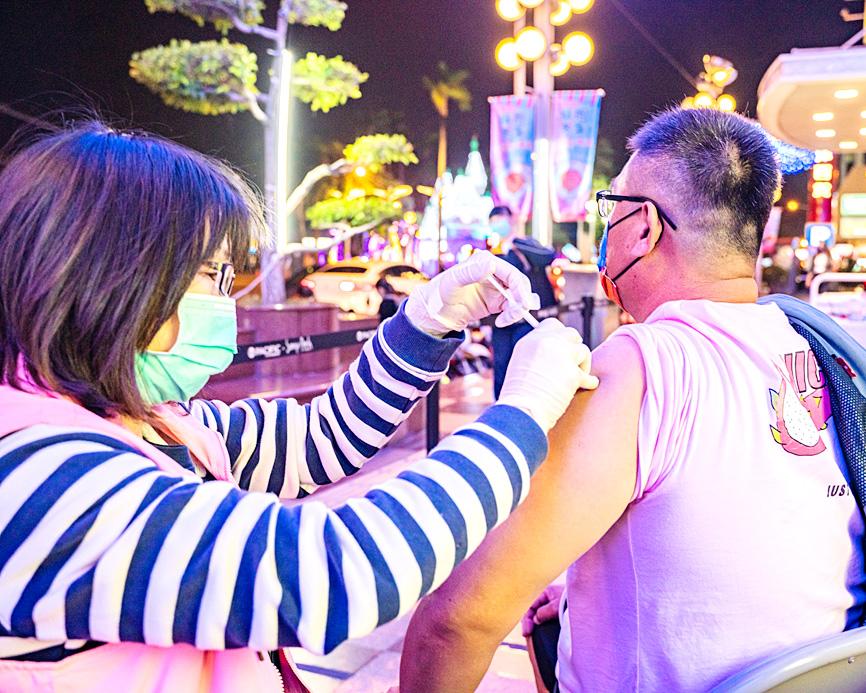The nation’s full vaccination coverage rate is expected to reach 60 percent today, the Central Epidemic Command Center (CECC) said yesterday as it announced the 17th round of vaccinations, in which first and second doses of the AstraZeneca and Pfizer-BioNTech COVID-19 vaccines are to be offered.
As of Friday, the nation’s first-dose vaccination rate was 78.12 percent and the full vaccination rate 59.73 percent, said Centers for Disease Control Deputy Director-General Chuang Jen-hsiang (莊人祥), who is the CECC’s spokesman.
The CECC had previously set a goal of achieving a full vaccination rate of 60 percent by the end of the year.

Photo: Hou Cheng-hsu, Taipei Times
However, thanks to cooperation between healthcare workers and the public, the goal is likely to be reached today, Chuang said.
The Executive Yuan has held three meetings this week to discuss how to further increase the nation’s full vaccination coverage rate to prevent another local outbreak, sources said.
To reach a full vaccination rate of at least 80 percent, it has ordered the establishment of vaccination stations at supermarkets and department stores for easy access, they said.
The CECC yesterday said first and second doses of the AstraZeneca and Pfizer-BioNTech vaccines would be offered in the 17th round of vaccinations.
Eligible recipients can register through the national COVID-19 vaccination booking system (https://1922.gov.tw) or make an appointment with designated healthcare facilities, it said.
Those eligible for a first dose of the AstraZeneca vaccine are unvaccinated people who were born on or before Dec. 9, 2003.
Eligible recipients for a second AstraZeneca dose or a mix-and-match regimen with a second dose of the Pfizer-BioNTech vaccine are people who have received a first dose of the AstraZeneca vaccine on or before Oct. 14.
Unvaccinated people who were born on or before Dec. 9, 2009, are eligible for a first dose of the Pfizer-BioNTech vaccine; and people who are 18 or older and received a first dose of the Pfizer-BioNTech vaccine on or before Nov. 11 are eligible for a second dose.
People can book an appointment for the Pfizer-BioNTech vaccine starting at 10am tomorrow. Bookings for the AstraZeneca vaccine start at 2pm tomorrow, while the deadlines for both are at noon on Tuesday. Vaccines would be administered from Thursday to Wednesday next week, the CECC said.
People who meet the vaccination requirements can also directly book an appointment for a first or second dose of any of the four available vaccines — AstraZeneca, Pfizer-BioNTech, Moderna and Medigen — with a designated healthcare facility, it added.
Eligible recipients can also directly book an appointment with the healthcare facilities for the mix-and-match regimen — a second dose of the Pfizer-BioNTech or Moderna vaccine following a first dose of the AstraZeneca vaccine — or a booster shot of the Moderna vaccine, it said.
The CECC yesterday reported 11 imported cases of COVID-19, nine of whom are vaccine breakthrough infections.
Additional reporting by Lee Hsin-fang

NATIONAL SECURITY THREAT: An official said that Guan Guan’s comments had gone beyond the threshold of free speech, as she advocated for the destruction of the ROC China-born media influencer Guan Guan’s (關關) residency permit has been revoked for repeatedly posting pro-China content that threatens national security, the National Immigration Agency said yesterday. Guan Guan has said many controversial things in her videos posted to Douyin (抖音), including “the red flag will soon be painted all over Taiwan” and “Taiwan is an inseparable part of China,” while expressing hope for expedited “reunification.” The agency received multiple reports alleging that Guan Guan had advocated for armed reunification last year. After investigating, the agency last month issued a notice requiring her to appear and account for her actions. Guan Guan appeared as required,

A strong cold air mass is expected to arrive tonight, bringing a change in weather and a drop in temperature, the Central Weather Administration (CWA) said. The coldest time would be early on Thursday morning, with temperatures in some areas dipping as low as 8°C, it said. Daytime highs yesterday were 22°C to 24°C in northern and eastern Taiwan, and about 25°C to 28°C in the central and southern regions, it said. However, nighttime lows would dip to about 15°C to 16°C in central and northern Taiwan as well as the northeast, and 17°C to 19°C elsewhere, it said. Tropical Storm Nokaen, currently

‘NATO-PLUS’: ‘Our strategic partners in the Indo-Pacific are facing increasing aggression by the Chinese Communist Party,’ US Representative Rob Wittman said The US House of Representatives on Monday released its version of the Consolidated Appropriations Act, which includes US$1.15 billion to support security cooperation with Taiwan. The omnibus act, covering US$1.2 trillion of spending, allocates US$1 billion for the Taiwan Security Cooperation Initiative, as well as US$150 million for the replacement of defense articles and reimbursement of defense services provided to Taiwan. The fund allocations were based on the US National Defense Authorization Act for fiscal 2026 that was passed by the US Congress last month and authorized up to US$1 billion to the US Defense Security Cooperation Agency in support of the

PAPERS, PLEASE: The gang exploited the high value of the passports, selling them at inflated prices to Chinese buyers, who would treat them as ‘invisibility cloaks’ The Yilan District Court has handed four members of a syndicate prison terms ranging from one year and two months to two years and two months for their involvement in a scheme to purchase Taiwanese passports and resell them abroad at a massive markup. A Chinese human smuggling syndicate purchased Taiwanese passports through local criminal networks, exploiting the passports’ visa-free travel privileges to turn a profit of more than 20 times the original price, the court said. Such criminal organizations enable people to impersonate Taiwanese when entering and exiting Taiwan and other countries, undermining social order and the credibility of the nation’s